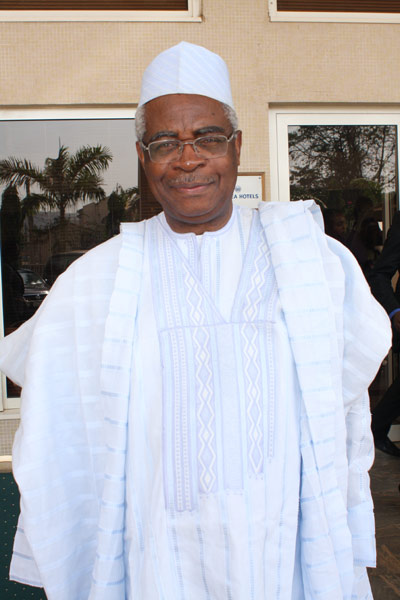As the debate on the Petroleum Industry Bill intensifies, the Chairman of the Senate Committee on Business and Rules, Senator Ita Enang on Wednesday dropped the bombshell that 83 per cent of oil blocks in the country are owned by Northerners.
“There should be equity and federal character in the allocation of oil blocks in this country. Eighty-three per cent of present oil blocks are owned by Northerners,” he said on the floor of the Senate without any contradiction from a senior lawmaker.
Enang, who represents Akwa Ibom North East (Uyo Senatorial District) therefore demanded a review of oil block licenses in the country as he received encouragement from other senators from the south.
Enang’s disclosures came a da6 af5er the debate on the Petroleum Industry Bill saw the Senate split along North-South lines, with Northern senators staunchly opposed to the 10 per cent Host Community Fund in the bill.
The provision mandates oil companies in the Niger Delta to pay 10 per cent of their net profits for the developments of the communities.
Senator Enang went on to give a summary of the ownership of major oil blocks as evidence to back up his claims.
He started with Cavendish Petroleum, operators of OML 110, awarded to Alhaji Mai Deribe of Borno State (North-East) makes about N4bn monthly.
He continued, “Seplat/Platform Petroleum, which operates the ASUOKPU/UMUTU marginal field has Prince Sanusi Lamido (not CBN governor) as a major shareholder and director.
“South Atlantic Petroleum Limited (SAPETRO) was established by Gen. Theophilus Yakubu Danjuma, who doubles as the Chairman of Eni Nigeria Limited. SAPETRO partnered with Total Upstream Nigeria Limited to become operators of the OPL 246.
“AMNI International Petroleum and Development Company is owned by Alhaji (Colonel) Sani Bello of Kontagora, Niger State. They are the operators of OML 112 and OML 117.
“A former Petroleum Minister and OPEC Chairman, Rilwanu Lukman, another Northerner, manages AMNI oil blocks with key interests in NNPC/Vitol trading deal.
“Oriental Energy Resources Limited, a company owned by Alhaji Indimi, runs three oil blocks:OML15, the Okwok field and the Ebok field.
“OML 113 allocated to Yinka Folawiyo Petroleum Limited is owned by Alhaji W.I. Folawiyo.
“OPL 291 was awarded to Starcrest Energy Nigeria Limited, owned by Emeka Offor, which was sold by Starcrest to Addax Petroleum. Emeka Offor still has a stake in Addax operations in Nigeria.
“Conoil, owned by Mike Adenuga, is the oldest indigenous oil exploration company in Nigeria with six oil blocks.
“Alhaji Saleh Mohammed Gambo’s North East Petroleum Limited is the holder of the OPL 215 license. The company was awarded blocks OPL 276 and OPL 283 and closing thereupon a joint venture agreement with Centrica Resources Nigeria Limited and CCC Oil and Gas.
“INTEL is owned by Abubakar Atiku, Yar’adua and Ado Bayero and has substantial stakes in Nigeria’s oil exploration industry, and also in Sao Tome’s.
“These need to be looked into, revoked and reawarded. The Federal Character which is a principle applicable in every aspect of our national existence should also be brought into consideration in the application of our oil blocks, marginal fields and prospecting licenses.”
Enang’s disclosures came even as the lawmakers reached a consensus that the bill sail through second reading, while further legislative work would take care of the contentious issues.
Enang, a firm supporter of the PIB, also argued that the 10 per cent host community fund be retained, adding that it did not amount to additional derivation.
Senator Chris Anyanwu (Imo East) who also spoke in support of the bill said that it would address the issue of criminality in the sector.
She said, “The element I like most in the bill is the host community fund because it removes the motive for crime. It gives them a sense of belonging and ownership. Until the PIB is ready and people know that their investment is safe, they will not come to Nigeria.”
Senator Ayogu Eze (Enugu North) also urged his colleagues to throw their weight behind the bill so as to allow for the fine-tuning of the controversial areas.
Senator Olufemi Lanlehin (Oyo South) argued Section 191 of the bill gave too much powers to the President, which must be whittled down.
Northern senators who were previously staunchly against the bill shifted ground to give the bill a chance.
Senator Danjuma Goje (Gombe Central) expressed the new sentiment, saying, “I was one of those completely opposed to the bill but from the trend of the debate, it looked like the Senate is ready to do a thorough job without fear or favour. For this reason, I will join others and ask that this bill be considered while the contentious areas are addressed.”
He also proposed that the powers of the minister be reduced so that whoever is the minister is not a super minister.
Despite this, the provision for the host community fund received some opposition from the Senate Deputy Leader, Abdul Ningi (Bauchi Central), Senators Abdullahi Adamu (Nassarawa West); Adamu Makarfi(Kaduna North) and Nurudeen Abatemi (Kogi Central).
They however expressed hope that this issue would be properly addressed at the critical stages of the bill.
The debate on the general principles of the bill would be concluded today.

